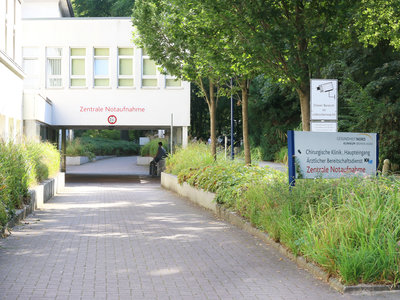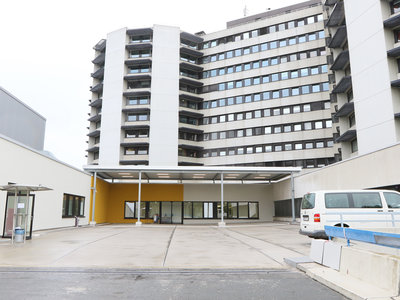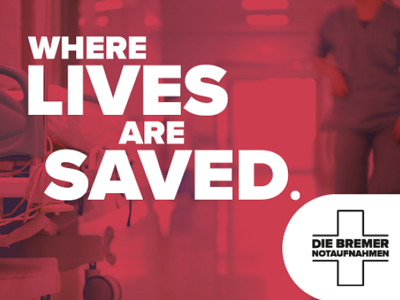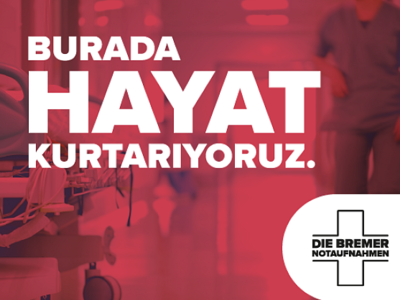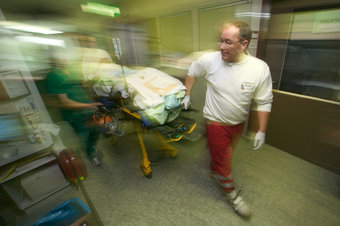Lebenslauf
Univ.-Prof. Dr. med. Andreas Kastrup
| seit 1. Februar 2020 | Chefarzt der Klinik für Neurologie mit Schlaganfalleinheit, Klinikum Bremen-Mitte |
| 2009-2020 | Chefarzt der Kliniken für Neurologie mit Stroke Unit, Institut für Klinische Neurophysiologie und Abteilung für neurologische Frührehabilitation, Klinikum Bremen-Ost und Klinikum Bremen-Mitte. |
| 2006-2009 | Universitätsprofessor, leitender Oberarzt und stellvertretender ärztlicher Direktor der Abteilung für Neurologie, Georg-August-Universität Göttingen |
| 2004-2006 | Oberarzt an der neurologischen Universitätsklinik der Friedrich-Schiller-Universität Jena |
| 2000-2004 | Neurologische Universitätsklinik und Klinik für Psychiatrie der Eberhard-Karls-Universität Tübingen, Facharzt, Habilitation |
| 1997-1999 | Postdoc an der Stanford University, USA |
| 1995-1996 | Arzt in Praktikum an der neurologischen Universitätsklinik der Eberhard-Karls-Universität Tübingen, Promotion |
| 1989-1995 | Studium der Medizin in Bonn |
| 1988 | Abitur |
Publikationen
Stuke H, Hanken K, Hirsch J, Klein J, Wittig F, Kastrup A, Hildebrandt H (2016) Cross-sectional and longitudinal relationships between depressive symptoms and brain atrophy in MS patients. Front Hum Neurosci 10:622 Rosemann S, Brunner F, Kastrup A, Fahle M (2017) Musical, visual and cognitive deficits after middle cerebral infarction. ENeurologicalSci 6: 25-32
Sander C, Eling P, Hanken K, Klein J, Kastrup A, Hildebrandt H (2016) The impact of MS-related cognitive fatigue on future brain parenchymal loss and relapse: A 17-month follow-up study. Front Neurol 21: 155
Hanken K, Bosse M, Möhrke K, Eling P, Kastrup A, Hildebrandt H (2016) Counteracting fatigue in multiple sclerosis with right parietal anodal transcranial direct current stimulation. Front Neurol 7: 154
Völter HU, Hildebrandt H, Kastrup A (2016) MS-assoziierte Fatigue - Welche Immuntherapie hilft? Akt Neurol 53: 511-518
Hanken K, Bosse M, Möhrke K, Eling P, Kastrup A, Antal A, Hildebrandt H (2016) Counteracting fatigue in multiple sclerosis with right parietal anodal transcranial direct current stimulation. Front Neurol 7: 154
Wasser K, Papanagiotou P, Brunner F, Hildebrandt H, Winterhalter M, Roth C, Kastrup A (2016) Impact of ASPECTS on CTA source images on outcome after thrombolysis or endovascular therapy in large vessel occlusions. Eur J Neurol 23: 1599-1605
Turgut N, Miranda M, Kastrup A, Eling P, Hildebrandt H (2016) tDCS combined with optokinetic drift reduces egocentric neglect in severely impaired post-acute patients. Neuropsychol Rehabil Jul 5: 1-12.
Kastrup A, Brunner F, Wasser K, Hildebrandt H, Roth C, Winterhalter M, Papanagiotou P (2016) Endovascular therapy versus thrombolysis in patients with anterior circulation stroke in every day clinical practice. Int J Stroke 11(5): 544-8.
Hanken K, Manousi A, Klein J, Kastrup A, Eling P, Hildebrandt H (2015) On the relation between self-reported fatigue and the posterior hypothalamic-brainstem network. Eur J Neurol 23(1): 101-109.
Hanken K, Eling P, Kastrup A, Klein J, Hildebrandt H (2015) Integrity of hypothalamic fibers and cognitive fatigue in multiple sclerosis. Mult Scler Rel Disord 4(1): 39-46.
Ehlers MR, López Herrero C, Kastrup A, Hildebrandt H (2015) The P300 in middle cerebral artery strokes or hemorrhages. Outcome predictions and source localization. Clin Neurophysiol 126(8): 1532-1538.
Balint B, Jarius S, Nagel S, Haberkorn U, Probst C, Blöcker IM, Bahtz R, Komorowski L, Stöcker W, Kastrup A, Kuthe M, Meinck HM (2014) Progressive encephalomyelitis with rigidity and myoclonus: a new variant with DPPX antibodies. Neurology 82(17): 1521-8.
Wöpking S, Kastrup A, Lentschig M, Brunner F (2013) Recurrent strokes due to transient vasospams of the extracranial internal carotid artery. Case Rep Neurol 5(2): 143-8.
Hildebrandt H, Fink F, Kastrup A, Haupts M, Eling (2013). Cognitive profiles of patients with mild cognitive impairment or dementia in Alzheimer's or Parkinson's Disease. Dement Geriatr Cogn Disord Extra; 3: 102-112.
Gröschel S, Sohns JM, Schmidt-Samoa C, Baudewig J, Dechent P, Becker L, Kastrup A (2013). Effects of age on negative BOLD signal changes in the primary somatosensory cortex. NeuroImage 1; 71: 10-8.
Gossmann A, Kastrup A, Kerkhoff G, Lopez C, Hildebrandt H (2013) Prism adaptation improves ego-centred but not allocentric neglect in early rehabilitation patients. Neurorehabil Neural Repair 27(6): 534-41.
Hildebrandt H, Fink F, Eling P, Stuke H, Klein J, Lentschig M, Kastrup A, Thiel C, Breckel T (2012) Neural correlates of stimulus response and stimulus outcome shifting in healthy participants and MS patients. Brain and Cognition, 81: 57-66
Kraft A, Grimsen C, Kehrer S, Bahnemann M, Spang K, Prass M, Irlbacher K, Köhnlein M, Lipfert A, Brunner F, Kastrup A, Fahle M, Brandt SA (2014) Neurological and neuropsychological characteristics of occipital, occipito-temporal and occipito-parietal infarction. Cortex 56: 38-50.
Brunner F, Tomandl B, Hanken K, Hildebrandt H, Kastrup A (2014) Impact of collateral circulation on early outcome and risk of hemorrhagic complications after systemic thrombolysis. Int J Stroke 9(8): 992-998.
Lehmann P, Eling P, Kastrup A, Grothues O, Hildebrandt H (2013) Self-reported sleep problems, but not fatigue, lead to ecline in sustained attention in MS patients. Mult Scler 19(4): 490-7.
Wasser K, Hildebrandt H, Schnaudigel S, Stojanovic T, Schmidt H, Gröschel K, Pilgram-Pastor S, Knauth M, Kastrup A (2012) Age-dependent effects of carotid endarterectomy or stenting on cognitive performance. J Neurol 259(11): 2309-18
Kallenberg K, Rühlmann J, Baudewig J, Larsen J, Gröschel S, Dechent P, Kastrup A, Knauth M (2013) Analysis of reserve capacity and subsequent stenting in a case of subacute occlusion of the internal carotid artery. Clinical Neuroradiology 23(3): 225-229.
Foerch C, Haripyan V, Niessner M, Back T, Bauerle M, Braun H, Dambinova SA,De Mrachis GM, Ebke M, Ferbert A, Grehl H, Hamann GF, Hohmann C, Jacobs A, Kastrup A, Katan M, Klimpe S, Letzel S, Marx J, Mehlhorn C, Missler U, Wagner-Heck M, Weissenborn K, Worthmann H, Steinmetz H, Sitzer M (2012) Diagnostic accuracy of plasma glial fibriallary acid protein (GFAP) for the differentiation between intracerebral hemorrhage and cerebral ischemia in patients with symptoms of acute stroke - the Biomarker for Rapid Diagnosis of Hemispheric Stroke (BE FAST) study. Clin Chem 58 (1): 237-245
Mödden C, Behrens M, Damke I, Eilers N, Kastrup A, Hildebrandt H (2012) A randomised trial of three interventions to treat homonymous hemianopia during inpatient stroke rehabilitation. Neurorehab Neural Re 26(5): 463-69
Ehrenreich H, Kästner A, Weissenborn K, Streeter J, Sperling S, Wang K, Worthmann H, Hayes R, von Ahsen N, Kastrup A, Jeromin A, Herrmann F (2011) Circulating damage marker profiles support the neuroprotective effect of erythropoietin in ischemic stroke patients. Mol Med 17 (11-12): 1306-10
Schmidt H, Heinemann T, Elster J, Djukic M, Harscher S, Neubieser K, Prange H, Kastrup A, Rohde V (2011) Cognition after malignant media infarction and decompressive hemicraniectomy - a retrospective observational study. BMC Neurology 11: 77
Brunner F, Tomandl B, Schröter A, Mellinghoff C, Haldenwanger A, Hildebrandt H, Kastrup A (2011) Hemorrhagic complications after systemic thrombolysis in acute stroke patients with abnormal baseline coagulation. Eur J Neurol 18 (12): 1407-11
Kiy G, Lehmann P, Hahn HK, Eling P, Kastrup A, Hildebrandt H (2011) Decreased hippocampal volume, indirectly measured, is associated with depressive symptoms and consolidation deficits in Multiple Sclerosis. Mult Scler J 17(9): 1088-97
Gröschel K, Schnaudigel S, Pilgram-Pastor S, Wasser K, Ernemann U, Knauth M, Kastrup A (2011) Factors associated with time delay to carotid stenting in patients with a symptomatic carotid artery stenosis. J Neurol 258(7): 1228-33
Audebert H, Singer O, Gotzler B, Vatankhah B, Fiehler J, Lansberg, Kastrup A, Rovira A, Gass A, Rosso C, Derex L, Kim J, Heuschmann P (2011) Is higher risk for secondary hemorrhage after thrombolysis in right non-lacunar strokes caused by underestimation of right cortical deficits? Neurology 76(7): 629-36
Haldenwanger A, Eling P, Kastrup A, Hildebrandt H (2010) Correlation between cognitive impairment and CSF biomarkers in amnestic MCI, non-amnestic MCI and Alzheimer's Dementia. J Alzheimers Dis 22(3): 971-80.
Wasser K, Pilgram-Pastor S, Schnaudigel S, Stojanovic T, Schmidt H, Knauf J, Gröschel K, Knauth M, Kastrup A (2011) New brain lesions after carotid revascularization are not associated with cognitive performance. J Vasc Surg 53(1): 61-70.
Ebke M, Jürgens KU, Tomandl B, Merten U, Kastrup A (2011) Surgical treatment of space occupying edema and hemorrhage due to cerebral venous thrombosis during pregnancy: A case report. Neurocrit Care 15(1): 166-9.
Klingner C, Huonker R, Flemming S, Hasler C, Brodoehl S, Preul C, Burmeister H, Kastrup A, Witte OW (2011) Functional deactivations: Multiple ipsilateral brain areas engaged in the processing of somatosensory information. Hum Brain Mapping 32(1): 127-140.
Göricke B, Lingor P, Stadelmann-Nessler C, Bähr M, Kastrup A, Kermer P (2012) MSA-C presenting with leukencephalopathy. J Neurol Neurosurg Psychiatry 83(2): 230-2.
Dengler R, Diener HC, Schwartz A, Grond M, Schumacher H, Machnig T, Eschenfelder CC, Schenkel J, Weissenborn K, Kastrup A, Haberl R (2010) Eearly treatment with aspirin plus extended-release dipyridamole versus aspirin alone for transient ischemic attack/ischemic stroke within 24 hours of symptom onset (EARLY-Trial): a randomised, open-label, blinded endpoint study. Lancet Neurology 9(2): 159-166.
Menke J, Lüthje L, Kastrup A, Larsen J (2010) Thromboembolism in nonvalvular atrial fibrillation. Am J Cardiol 105(4): 502-10.
Riecker A, Kassubek J, Gröschel K, Ackermann H, Kastrup A (2010) Role of the unaffected hemisphere in recovery from chronic subcortical stroke. Hum Brain Mapping 31(7): 1017-29.
Ehrenreich H, Weissenborn K, Prange H, Schneider D, Weimar C, Wartenberg K, Schellinger PD, Bohn M, Becker H, Wegrzyn M, Jähnig P, Herrmann M, Knauth M, Bähr M, Heide W, Wagner A, Schwab S, Reichmann H, Schwendemann G, Dengler R, Kastrup A, Bartels C (2009) Recombinant human erythropoietin in the treatment of acute ischemic stroke. Stroke 40 (12): 647-56.
Terborg C, Gröschel K, Fitzek C, Ringer T, Witte OW, Kastrup A (2009) Non-invasive assessment of cerebral blood flow and oxygenation in acute ischemic stroke by near-infrared spectroscopy. Eur Neurol 62 (6): 338-43.
Singer OC,Kurre W, Humprich MC, Lorenz MW, Kastrup A, Liebeskind DS, Fiehler J, Berkefeld J, Neumann-Haefelin T (2009) Risk assessment of symptomatic intracerebral hemorrhage after thrombolysis using DWI-ASPECTS. Stroke 40 (8): 2743-8.
Gdynia HJ, Palm C, Kastrup A, Riecker A (2009) Vertebrobasilar insufficiency due to right aortic arch with isolation of the left subclavian artery. J Clin Neurosci 16(1): 89
Singer OC, Berkefeld J, Lorenz MW, Fiehler J, Albers GW, Lansberg MG, Kastrup A, Rovira A, Liebeskind DS, Gass A, Rosso C, Derex L, Kim JS, Neumann-Haefelin T (2009) Risk of symptomatic intracerebral hemorrhage in patients treated with intraarterial thrombolysis for acute stroke. Cerebrovasc Dis 27 (4): 368-374
Gröschel K, Schnaudigel S, Pilgram SM, Wasser K, Kastrup A (2009) A systematic review on outcome after stenting for intracranial atherosclerosis. Stroke 40(5): 340-347.


